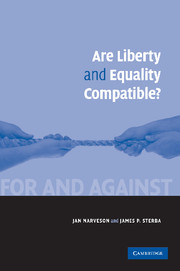5 - Response to Sterba
Published online by Cambridge University Press: 03 May 2010
Summary
Let me say, first, that I am grateful for James Sterba's care in stating and restating his and my positions – and also for carefully discussing many writers whom I fail to address in my own piece. I have narrow-mindedly concentrated on developing my own position, discussing mostly the special arguments advanced by Sterba himself, and have been rather ungenerous in attending to the arguments of the many others with whom I am in such sharp disagreement. I am pleased to see that he has in general done such a good job with those writers, sparing me the need to take up valuable space for doing it myself.
The question to address in this concluding brief riposte is of course the central point of disagreement, the central issue that divides us, and thus how to identify that central issue. In my view, this issue arises from the independence of persons. However they may be linked in various groupings, whatever their degrees of affections – or animosities – toward some or many, they are individuals with minds of their own, and they act on their own motivations, their own interests. As I see it, the basic question for moral theory is to what extent this independence is to be trimmed down in response to the impingements of one's fellows. In society, we are able to address each other, to direct praise and blame and to react in more substantial ways to each other's behavior, and the question is, with what aims in view we are to do that.
- Type
- Chapter
- Information
- Are Liberty and Equality Compatible? , pp. 260 - 266Publisher: Cambridge University PressPrint publication year: 2010



